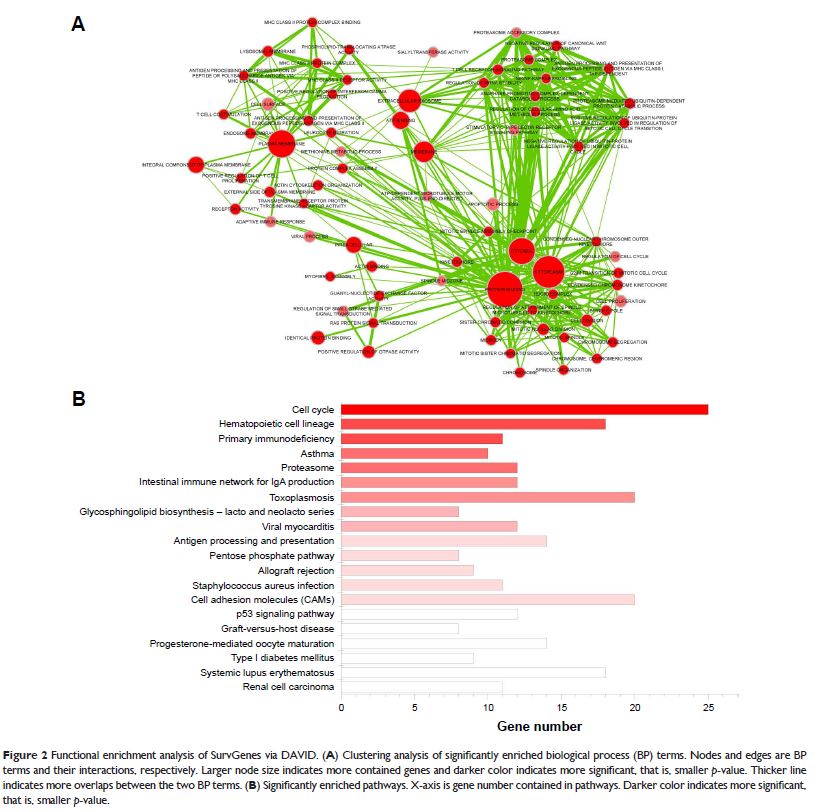108384
论文已发表
注册即可获取德孚的最新动态
IF 收录期刊
- 3.4 Breast Cancer (Dove Med Press)
- 3.2 Clin Epidemiol
- 2.6 Cancer Manag Res
- 2.9 Infect Drug Resist
- 3.7 Clin Interv Aging
- 5.1 Drug Des Dev Ther
- 3.1 Int J Chronic Obstr
- 6.6 Int J Nanomed
- 2.6 Int J Women's Health
- 2.9 Neuropsych Dis Treat
- 2.8 OncoTargets Ther
- 2.0 Patient Prefer Adher
- 2.2 Ther Clin Risk Manag
- 2.5 J Pain Res
- 3.0 Diabet Metab Synd Ob
- 3.2 Psychol Res Behav Ma
- 3.4 Nat Sci Sleep
- 1.8 Pharmgenomics Pers Med
- 2.0 Risk Manag Healthc Policy
- 4.1 J Inflamm Res
- 2.0 Int J Gen Med
- 3.4 J Hepatocell Carcinoma
- 3.0 J Asthma Allergy
- 2.2 Clin Cosmet Investig Dermatol
- 2.4 J Multidiscip Healthc

基于 20 个基因的预后模型可预测肺腺癌的存活率
Authors Zhao K, Li Z, Tian H
Received 1 December 2017
Accepted for publication 8 April 2018
Published 12 June 2018 Volume 2018:11 Pages 3415—3424
DOI https://doi.org/10.2147/OTT.S158638
Checked for plagiarism Yes
Review by Single-blind
Peer reviewers approved by Dr Cristina Weinberg
Peer reviewer comments 2
Editor who approved publication: Dr Samir Farghaly
Introduction: Lung adenocarcinoma (LAC) accounts for more than a half of
non-small cell lung cancer with high morbidity and mortality. Progression of
treatment has not accelerated the improvement of its prognosis. Hence, it is an
urgent need to develop novel biomarkers for its early diagnosis and treatment.
Materials and
methods: In this study, we proposed to
identify LAC survival-related genes through comprehensive analysis of
large-scale gene expression profiles. LAC gene expression data sets were
obtained from The Cancer Genome Atlas (TCGA). Identification of differentially
expressed genes (DEGs) in LAC compared with adjacent normal lung tissues was
first performed followed by univariate Cox regression analysis to obtain genes
that are significantly associated with LAC survival (SurGenes). Then, we
conducted sure independence screening (SIS) for SurGenes to identify more
reliable genes and the prognostic signature for LAC survival prediction.
Another two lung cancer data sets from TCGA and Gene Expression Omnibus (GEO)
were used for the validation of prognostic signature.
Results: A total of 20 genes were obtained, which were significantly
associated with the overall survival (OS) of LAC patients. The prognostic
signature, a weighted linear combination of the 20 genes, could successfully
separate LAC samples with high OS from those with low OS and had robust
predictive performance for survival (training set: p -value <2.2×10-16; testing set: p -value =2.04×10-5, area under the curve (AUC) =0.615). Combined with GEO data set, we
obtained four genes, that is, FUT4 , SLC25A42 , IGFBP1 , and KLHDC8B that are found in
both the prognostic signature and DEGs of LAC in GEO data set.
Discussion: The prognostic signature combined with multi-gene expression
profiles provides a moderate OS prediction for LAC and should be helpful for
appropriate treatment method selection.
Keywords: GEO, lung adenocarcinoma, SIS, survival, TCGA
